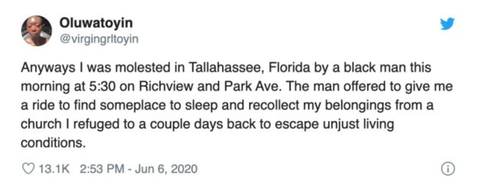Black women have long been the bedrock in the fight for civil rights. Still, when these movements gain traction, Black women are often left behind or erased entirely.
We’ve seen this
happen in the midst of the struggle for Black lives. The police killings of unarmed Black men are most often the catalysts for marches and mass protests—with the murder of Breonna Taylor as a recent notable exception—but Black women are also killed by police at an alarming rate. And even as Black women continue to lead and organize the movement, we’re often forgotten, which sparked the creation of #SayHerName, a rallying cry for recognition that Black women in particular are subject to both racist and gendered violence.
Noname, a Chicago rapper and poet, has been using her platform to highlight the dual oppressions Black women face. She also openly confronts gaps in her own knowledge with her followers, which eventually led her to start a book club for fans and allies to engage with new ideas while reading BIPOC-written fiction and nonfiction.
Like James Baldwin and Nikki Giovanni before her, Noname has been outspoken about the misogyny that can still exist in social movements, even as Black men and women are united in the fight for Black liberation. In June, she released “Song 33,” which pays tribute to the young activist Oluwatoyin "Toyin" Salau, who was found murdered just days after she tweeted about being sexually assaulted. Noname raps on “Song 33”:
Why Toyin body don't embody all the life she wanted?
A baby, just 19
I know I dream all black
I seen her everything, immortalizin' tweets all caps
They say they found her dead
One girl missin', another one go missin'
One girl missin', another
The song was also widely viewed as a response to J. Cole’s track “Snow on Tha Bluff,” which addressed police brutality but also seemed to chafe against the tone of Noname’s activism and his own feelings of inadequacy. (“She mad at the celebrities, low-key I be thinkin’ she talkin’ ‘bout me / Now I ain’t no dummy to think I’m above criticism / So when I see something that’s valid, I listen / But shit, it’s something about the queen tone that’s botherin’ me.”)
Cole’s words reminded me of when I recently defended a friend on Twitter after she opened up about the colorism and sexism she’s faced from Black men. We immediately faced scrutiny from people saying things like, “Can we focus on the police killing us?” “Why are you trying to divide Black people?” and “It’s not the time to talk about that.”
But if you want true equality for Black people, there will never be a “right time” to ask for what we deserve as Black women. The struggle is ongoing, and still, I could not believe the same people marching for equality and vowing to protect Black women were the same ones attacking us. Maybe the constant scrutiny from members of the community was part of the reason Noname temporarily deactivated her Twitter.
As I listen to “Song 33,” tears begin to run down my face. Society brands Black women as uniquely strong, conveniently forgetting that even the strongest among us also need help. Even as she was becoming a face of the movement, Toyin was especially vulnerable: Before her murder, she was escaping abuse by her family and sleeping in a church. The man who offered her a place to shower and sleep allegedly sexually assaulted her and has been charged with her murder.

In her 2016 TED Talk, Kimberle Crenshaw instructed the audience to stand and remain standing if they knew the names she said. When she listed the names of Black men killed by the police, many audience members remained standing. But only four audience members remained when she began to recite the names of Black women killed by the police: Atatiana Jefferson, Michelle Cusseaux, Brayla Stone, Akhenaton Jones.
Do you know these names? Do you know their stories? You are not seeing injustice clearly if you are looking through a lens that places more value on the lives of Black men over women. Violence and racism toward Black men becomes the cover story, with Black women as the footnote. Even if the media coverage stops and the criminal justice system stalls out—as is so often the case—the movement must not follow suit, we must demand more and better as we fight for the liberation of every Black life.
If you think Black women voicing their pain only sows more division, you are part of the problem. We cannot simultaneously fight racism while policing uncomfortable conversations that aim to hold members of our own community accountable.
We must demand more and better as we fight for the liberation of every Black life.
I am thankful for the outlet Noname has created. It has inspired me to stand firmly and be unapologetic in speaking my truth. Despite any negative backlash I receive, I know there is always power in your testimony.
Moving forward, we must center the idea that freedom for everyone is dependent on freedom for Black women—which must include Black men recognizing the harm caused by misogyny and erasure. Empowering Black women means a brighter future for everyone, and if we want to take care of the community, we must take care of and center the ones who’ve birthed it.
